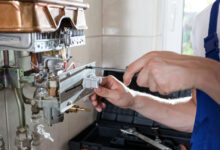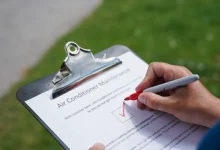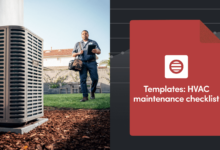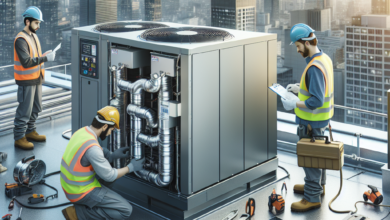HVAC Maintenance Contract Template
HVAC Maintenance Contract Template – Ensuring proper maintenance of your HVAC system is essential for its longevity and optimal performance. An HVAC maintenance contract is a vital tool that helps both homeowners and businesses streamline their HVAC management. In this blog article, we will provide you with a detailed and comprehensive guide on HVAC maintenance contract templates, covering everything from its importance to the key elements that should be included.
Understanding the HVAC Maintenance Contract
When it comes to HVAC systems, regular maintenance is the key to preventing breakdowns, improving energy efficiency, and extending the lifespan of your equipment. An HVAC maintenance contract is a written agreement between the property owner and a professional HVAC service provider. This contract outlines the terms and conditions of the maintenance services to be provided, ensuring that both parties are on the same page regarding expectations, responsibilities, and costs.
By having an HVAC maintenance contract in place, you can establish a clear framework for your HVAC system’s upkeep and ensure that all necessary tasks are regularly performed. It provides peace of mind, knowing that your system will be maintained by professionals according to a predetermined schedule. This proactive approach helps to identify and address potential issues before they escalate into costly repairs, saving you time, money, and inconvenience in the long run.
The Benefits of an HVAC Maintenance Contract
There are numerous benefits to having an HVAC maintenance contract in place. Firstly, it ensures regular maintenance and servicing of your HVAC system. By scheduling routine inspections and tune-ups, potential problems can be detected early, preventing major breakdowns and costly repairs.
Secondly, an HVAC maintenance contract helps to optimize the energy efficiency of your system. Regular cleaning, lubrication, and calibration of the various components ensure that your HVAC system operates at its peak performance, reducing energy consumption and lowering utility bills.
Thirdly, a maintenance contract provides priority service. In the event of an HVAC system failure, contract holders often receive priority scheduling and discounted rates for repairs, minimizing downtime and inconvenience.
Lastly, an HVAC maintenance contract enhances the lifespan of your equipment. With regular maintenance and prompt repairs, your HVAC system can operate efficiently for a longer period, postponing the need for expensive replacements.
Key Elements of an HVAC Maintenance Contract
When creating an HVAC maintenance contract, it is crucial to include certain key elements to ensure clarity and avoid any misunderstandings. These elements typically include:
Scope of Services
This section outlines the specific services that will be provided under the maintenance contract. It includes routine maintenance tasks such as filter replacement, coil cleaning, lubrication, and system inspections. Additionally, it may cover emergency repairs and any other services agreed upon by both parties.
Maintenance Schedule
Defining a maintenance schedule is essential to ensure that regular inspections and servicing are performed at appropriate intervals. The schedule should specify the frequency of maintenance visits, taking into account the manufacturer’s recommendations and any specific requirements of the HVAC system.
Terms and Conditions
This section outlines the general terms and conditions of the maintenance contract, including the duration of the agreement, termination clauses, payment terms, and any penalties for non-compliance. It is essential to clearly define the responsibilities of both parties to avoid any disputes or misunderstandings.
Equipment Covered
Specify the HVAC equipment covered under the maintenance contract, including the make, model, and serial numbers. This ensures that there is no confusion regarding the equipment being serviced and helps the service provider come prepared with the necessary tools and parts.
Costs and Payment Schedule
This section details the costs associated with the maintenance contract. It includes the total cost, any upfront payments or deposits required, and the payment schedule (e.g., monthly, quarterly, or annually). It is essential to be transparent about the pricing structure to avoid any surprises or misunderstandings.
Warranty and Liability
Clearly outline any warranties provided by the HVAC service provider for the maintenance work performed. Additionally, define the liability of both parties in case of damages or accidents that may occur during the maintenance process. It is recommended to consult with legal professionals to ensure proper coverage and protection.
Contract Renewal and Termination
Specify the procedures for contract renewal and termination. This includes the notice period required for termination and any fees or penalties associated with early termination. It is essential to provide clear guidelines to avoid any confusion or disputes when the time comes to renew or terminate the contract.
Customizing Your HVAC Maintenance Contract Template
While there are standard templates available for HVAC maintenance contracts, it is essential to customize them to suit your specific needs and requirements. One size does not fit all when it comes to HVAC systems, so tailoring the contract template ensures that it accurately reflects the unique characteristics of your system.
Identify Your System’s Specific Needs
Start by assessing your HVAC system’s specific needs. Consider factors such as the type of equipment, its age, usage patterns, and any specific maintenance requirements recommended by the manufacturer. This information will help you determine the scope of services and customize the contract template accordingly.
Include Additional Services
If your HVAC system requires any additional services beyond routine maintenance, such as specialized cleaning or specific equipment checks, make sure to include them in the contract. Customizing the template allows you to address these unique requirements and ensure that they are met.
Define Preferred Communication Channels
Specify your preferred communication channels for scheduling maintenance visits, reporting issues, and seeking assistance. Whether it’s phone calls, emails, or an online portal, clearly define how you expect to interact with the HVAC service provider to ensure smooth communication and prompt responses.
Adjust the Maintenance Schedule
Modify the maintenance schedule in the template to align with your HVAC system’s specific needs. Consider factors such as system usage, seasonal variations, and any specific maintenance recommendations from the manufacturer. By adjusting the schedule, you can ensure that the maintenance activities are carried out at the most appropriate times.
Review and Revise Terms and Conditions
Review the standard terms and conditions in the contract template and revise them based on your requirements. Pay attention to payment terms, contract duration, renewal procedures, and any other clauses that need customization to accurately reflect the agreement between you and the HVAC service provider.
Legal Considerations for HVAC Maintenance Contracts
When creating an HVAC maintenance contract, it is essential to consider the legal aspects to protect both parties involved. While it is recommended to seek legal advice for specific situations, here are some general legal considerations to keep in mind:
Liability and Insurance Coverage
Specify the liability of both parties in case of damages or accidents that may occur during the maintenance process. It is important to ensure that the HVAC service provider has appropriate insurance coverage to protect against any potential liabilities.
Compliance with Local Regulations
Ensure that the maintenance contract complies with all relevant local regulations and industry standards. Familiarize yourself with any licensing or certification requirements for HVAC service providers in your area and include provisions in the contract to ensure compliance.
Intellectual Property Rights
If the HVAC service provider uses any proprietary software, tools, or methodologies during the maintenance process, clarify the ownership and usage rights of such intellectual property. This protects both parties’ interests and avoids any potential disputes in the future.
Dispute Resolution Mechanism
Include a dispute resolution mechanism in the contract, such as mediation or arbitration, to provide a framework for resolving any conflicts that may arise. This helps to avoid costly legal proceedings and encourages amicable resolution of disputes.
Review and Approval by Legal Professionals
Before finalizing the HVAC maintenance contract, it is advisable to have it reviewed and approved by legal professionals experienced in contract law. They can provide valuable insights and ensure that the contract adequately protects your interests.
Frequently Asked Questions about HVAC Maintenance Contracts
Understanding the ins and outs of HVAC maintenance contracts can be overwhelming. Here are answers to some frequently asked questions to provide clarity:
1. How long should an HVAC maintenance contract be?
The duration of an HVAC maintenance contract can vary based on your specific needs and preferences. It can range from one to five years or even longer. Consider factors such as the age of your HVAC system, the manufacturer’s recommended maintenance intervals, and your budget when determining the contract duration.
2. What happens if either party breaches the contract?
In the event of a contract breach, the non-breaching party has legal recourse to seek remedies. This can include compensation for damages, termination of the contract, or other appropriate actions as specified by the governing laws and provisions of the contract.
3. Can I transfer the HVAC maintenance contract if I sell my property?
In most cases, HVAC maintenance contracts are not transferable to new property owners unless specifically stated in the contract. Consult with the HVAC service provider to discuss the possibility of transferring the contract to the new owner or negotiate a new agreement if necessary.
4. Can I cancel an HVAC maintenance contract before its expiration?
Cancellation of an HVAC maintenance contract before its expiration may be possible, but it is essential to review the termination clauses specified inthe contract. Typically, there will be provisions for termination, including notice periods and any associated fees or penalties. It is crucial to follow the outlined procedures to avoid any legal complications or financial obligations.
5. What happens if I miss a scheduled maintenance visit?
If you miss a scheduled maintenance visit, it is important to communicate with the HVAC service provider as soon as possible to reschedule. Regular maintenance visits are essential for the proper functioning of your HVAC system, so it is recommended to make up for any missed visits to ensure its optimal performance and longevity.
6. Can I make changes to the HVAC maintenance contract after it is signed?
Making changes to an HVAC maintenance contract after it is signed may be possible but should be done in consultation with the HVAC service provider. Any changes should be documented in writing and agreed upon by both parties to ensure clarity and avoid any misunderstandings or disputes in the future.
7. What if I am not satisfied with the quality of the maintenance services provided?
If you are not satisfied with the quality of the maintenance services provided, it is important to address the issue with the HVAC service provider directly. Communicate your concerns and expectations clearly, and give them an opportunity to rectify any shortcomings. If the issue persists, refer to the dispute resolution mechanism outlined in the contract to seek a resolution.
8. Are there any additional costs not included in the maintenance contract?
While an HVAC maintenance contract typically covers routine maintenance tasks, there may be additional costs for any repairs or replacement of parts not covered under the contract. It is important to clarify with the HVAC service provider what is included in the contract and what falls outside its scope to avoid any surprises or misunderstandings.
9. Can I upgrade or modify my HVAC system during the contract period?
Upgrading or modifying your HVAC system during the contract period is possible, but it is important to discuss these changes with the HVAC service provider. Depending on the nature of the upgrades or modifications, adjustments to the contract may be necessary to reflect the changes in equipment or services required.
10. Can I have multiple HVAC systems covered under a single maintenance contract?
Depending on the size and complexity of your property, it may be possible to have multiple HVAC systems covered under a single maintenance contract. However, it is important to discuss this with the HVAC service provider to ensure that the contract adequately addresses the maintenance needs of all the systems and includes appropriate pricing and service provisions.
How to Choose the Right HVAC Maintenance Contract Template
Choosing the right HVAC maintenance contract template is crucial for effective HVAC system management. Here are some tips to help you select a suitable template:
1. Evaluate Your Specific Needs
Understand your HVAC system’s specific needs, including the type of equipment, its age, and any unique maintenance requirements. This will help you narrow down templates that align with your system’s requirements.
2. Consider the Scope of Services
Review the scope of services included in the template. Ensure that it covers all the essential maintenance tasks required for your HVAC system, such as inspections, cleaning, and tune-ups.
3. Check for Customization Options
Look for templates that allow customization. This will enable you to tailor the contract to match your specific requirements, including additional services, equipment details, and any specific terms and conditions.
4. Assess the Terms and Conditions
Thoroughly review the terms and conditions outlined in the template. Ensure that they are fair, reasonable, and align with your expectations. Pay attention to payment terms, contract duration, termination clauses, and any other provisions that may impact your agreement.
5. Seek Professional Assistance
If you are unsure about selecting the right template or customizing it to suit your needs, consider seeking assistance from legal professionals or HVAC experts. They can provide guidance and ensure that the contract template meets all legal requirements and industry standards.
Steps to Implement an HVAC Maintenance Contract
Implementing an HVAC maintenance contract involves the following steps:
1. Research and Select a Reliable HVAC Service Provider
Conduct thorough research to find a reputable HVAC service provider with experience in maintenance contracts. Consider factors such as their expertise, certifications, reputation, and customer reviews. Select a provider that aligns with your specific needs and requirements.
2. Review and Customize the Contract Template
Review the selected contract template and customize it to match your HVAC system’s specific needs. Modify the scope of services, terms and conditions, and any other elements to ensure that the contract accurately reflects your expectations and requirements.
3. Consult with Legal Professionals
Before finalizing the contract, consult with legal professionals experienced in contract law to review and provide feedback. They can ensure that the contract is legally sound, protects your interests, and complies with all relevant regulations.
4. Schedule an Initial Assessment
Contact the HVAC service provider to schedule an initial assessment of your HVAC system. This assessment will help them understand the current condition of your system and determine any immediate maintenance or repair needs before initiating the contract.
5. Sign the Contract
Once all parties are satisfied with the contract terms and conditions, schedule a signing ceremony. Ensure that both you and the HVAC service provider have a signed copy of the contract for reference.
6. Set Up a Maintenance Schedule
Work with the HVAC service provider to establish a maintenance schedule that suits your needs and aligns with the manufacturer’s recommendations. Discuss the frequency of visits and any specific requirements for seasonal maintenance or system check-ups.
7. Implement Regular Maintenance Visits
Stick to the agreed-upon maintenance schedule and allow the HVAC service provider access to your HVAC system as per the contract. Regularly scheduled visits will ensure that your system receives the necessary maintenance and inspections to keep it running smoothly.
8. Monitor and Evaluate Performance
Continuously monitor the performance of the HVAC service provider and evaluate the quality of their maintenance work. Keep track of any issues, concerns, or improvements needed and discuss them with the provider to ensure ongoing satisfaction with the services rendered.
9. Renew or Update the Contract
Prior to the contract’s expiration, evaluate the performance of the HVAC service provider and assess whether any changes or updates are needed. Discuss contract renewal or modifications as necessary to ensure ongoing maintenance and management of your HVAC system.
Benefits of Regular HVAC Maintenance
Regular HVAC maintenance offers numerous benefits that contribute to the optimal performance and longevity of your system. Some key benefits include:
1. Improved Energy Efficiency
Regular maintenance ensures that your HVAC system operates at its peak efficiency. Clean filters, lubricated components, and calibrated settings reduce energy consumption, resulting in lower utility bills and a reduced carbon footprint.
2. Increased System Lifespan
Routine maintenance helps identify and address potential issues early on, preventing major breakdowns and extending the lifespan of your HVAC system. By keeping all components in good working condition, you can avoid premature replacements and save on costly repairs.
3. Enhanced Indoor Air Quality
Regular maintenance includes cleaning and inspecting air filters, coils, and ductwork. This improves indoor air quality by removing dust, allergens, and pollutants, creating a healthier living or working environment for occupants.
4. Fewer Emergency Repairs
By adhering to a regular maintenance schedule, you significantly reduce the risk of unexpected breakdowns and emergency repairs. Early detection of potential issues allows for timely repairs, preventing system failures and minimizing downtime.
5. Cost Savings
Investing in regular maintenance may seem like an additional expense, but it ultimately saves you money in the long run. By avoiding major repairs and breakdowns, you can minimize repair costs and extend the lifespan of your HVAC system, resulting in significant cost savings over time.
6. Improved Comfort
A well-maintained HVAC system provides consistent and reliable heating or cooling, ensuring optimal comfort throughout your property. By addressing any performance issues and optimizing system settings, you can enjoy a comfortable indoor environment year-round.
7. Enhanced System Performance
Regular maintenance keeps your HVAC system in peak condition, allowing it to function at its best. This translates into better temperature control, improved airflow, and quieter operation, enhancing overall system performance.
Tips for Monitoring and Evaluating HVAC Maintenance Performance
Monitoring and evaluating the performance of your HVAC maintenance provider is crucial to ensure the effectiveness of their services. Here are some tips to help you assess the quality of the maintenance work:
1. Establish Clear Performance Metrics
Define clear performance metrics that align with your expectations and goals. These metrics may include energy consumption, system uptime, indoor air quality measurements, and customer satisfaction surveys. Regularly monitor and evaluate these metrics to gauge the maintenance provider’s performance.
2. Conduct Regular Inspections
Perform regular inspections of your HVAC system to verify that the maintenance tasks specified in the contract are being carried out effectively. Check for cleanliness, proper lubrication, and signsof wear and tear. Document any concerns or issues that need to be addressed by the maintenance provider.
3. Seek Feedback from Occupants
Engage with the occupants of your property to gather feedback on the performance of the HVAC system. Inquire about comfort levels, any noticeable issues, or changes in air quality. Their input can provide valuable insights into the effectiveness of the maintenance services.
4. Monitor Energy Consumption
Track your energy consumption over time to identify any significant changes or anomalies. A well-maintained HVAC system should exhibit consistent energy usage patterns. Any sudden spikes or deviations may indicate underlying issues that need attention.
5. Review Maintenance Reports
Regularly review the maintenance reports provided by the service provider. These reports should detail the tasks performed, any identified issues, and recommendations for future maintenance. Assess the thoroughness and accuracy of these reports to ensure that all necessary steps are being taken.
6. Communicate and Address Concerns
If you have any concerns or issues regarding the maintenance services provided, communicate them to the service provider promptly. Open and transparent communication is essential for resolving any gaps or shortcomings in the maintenance work.
7. Request Documentation and Certifications
Ask the maintenance provider for documentation and certifications that validate their qualifications and expertise. This includes proof of licensing, insurance coverage, and any relevant industry certifications. These documents serve as evidence of their professionalism and commitment to quality.
8. Seek Third-Party Audits
Consider engaging a third-party auditor or HVAC specialist to conduct periodic audits of the maintenance work. Their unbiased assessment can provide an objective evaluation of the service provider’s performance and identify areas for improvement.
9. Evaluate Customer Service and Responsiveness
Assess the quality of customer service and responsiveness exhibited by the maintenance provider. Prompt response times, clear communication, and a proactive approach to addressing concerns are indicators of a reliable and dedicated service provider.
10. Regularly Review and Assess Performance
Schedule regular performance reviews with the maintenance provider to discuss their performance, address any concerns, and identify opportunities for improvement. These reviews should be conducted at least annually or as needed based on the scope and complexity of the HVAC system.
Conclusion
Incorporating a well-structured and comprehensive HVAC maintenance contract template is crucial for ensuring the smooth operation and longevity of your HVAC system. By following the guidelines provided in this blog article, you can create a unique and detailed contract that caters to your specific HVAC management needs. Remember, a well-documented contract is the foundation for a successful HVAC maintenance plan.
From understanding the importance of HVAC maintenance contracts to customizing the template, considering legal aspects, and monitoring performance, this guide covers all the essential aspects of HVAC system management. By implementing a well-designed maintenance contract and working with a reliable service provider, you can enjoy the benefits of improved energy efficiency, extended system lifespan, enhanced indoor air quality, and reduced repair costs.
Take the time to research and select a reputable HVAC service provider, customize the contract to match your specific needs, and regularly evaluate the performance of the maintenance services. By doing so, you can ensure that your HVAC system operates optimally, providing comfort and efficiency for years to come.









